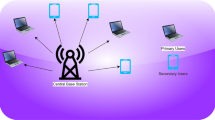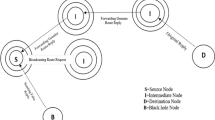Abstract
Many existing studies just considered that nodes in a Mobile Ad Hoc NETwork (MANET) would fully cooperate to forward packets for one another. However, this assumption does not hold in many scenarios. The node selfishness in relay cooperation will certainly influence the overall performance of routing in MANETs. In this work, we investigate the energy-aware routing problem in MANETs with nodes’ selfishness. We model the situation of node cooperation in energy-aware routing by using game theory. We consider the competitive and cooperative relationship between the nodes to formulate the game for MANETs. An incentive mechanism is given in order to encourage forwarding cooperation during energy-aware routing. Nodes are encouraged to forward more data packets for others in order to acquire more services from others. We also carry out a simulation for the proposed method and perform detailed analysis in this work. From the results of the simulation, we argue that it’s possible to find out a suitable configuration for a MANET to support more efficient energy-aware routing through our method.









Similar content being viewed by others
References
Corson S, Macker J (1998) Mobile ad hoc networking (MANET): routing protocol performance issues and evaluation considerations (Internet-draft). Mobile Ad-hoc Network (MANET) Working Group, IETF
Mauve M, Widmer J, Hartenstein H (2001) A survey on position-based routing in mobile ad hoc networks. IEEE Netw 1(6):30–39
Zhu Y, Xu B, Shi X, Wang Y (2013) A survey of social-based routing in Dela tolerant networks: positive and negative social effects. IEEE Commun Surv Tutorials 15(1):387–401
Jung S, Hundewale N, Zelikovsky A (2005) Energy efficiency of load balancing in MANET routing protocols. Proc. 6th Int. Conf. on Software Eng., AI, Networking and Parallel/ Distributed Computing, 2005 and First ACIS Int. Workshop on Self-Assembling Wireless Networks, p 476–483
Fudenberg D, Tirole J (1991) Game theory. MIT Press, Cambridge
Clausen T, Jacquet P (2003) Optimized link state routing protocol (OLSR). RFC 3626, IETF Network Working Group
Perkins C, Belding-Royer E, Das S (2003) Ad hoc on-demand distance vector (AODV) routing. RFC 3561, IETF Network Working Group
Johnson DB, Maltz DA (1996) Dynamic source routing in ad hoc wireless networks. In: Imielinski, Korth (eds) Mobile computing, vol. 353. Kluwer Academic Publishers, Boston
Ko YB, Vaidy N (2000) Location-aided routing in mobile ad hoc networks. ACM Wireless Netw J 6(4):307–321
Grossglauser M, Vetterli M (2003) Locating nodes with EASE: last encounter routing in ad hoc networks through mobility diffusion. Proc. INFOCOM 2003, 3:1954–1964
Dubois-Ferriere H, Grossglauser M, Vetterli M (2003) Age matters: efficient route discovery in mobile ad hoc networks using encounter age. Proc MobiHoc 2003:257–266
Lee SJ, Su W, Gerla M (2001) Wireless ad hoc multicast routing with mobility prediction. Mobile Netw Appl 6(4):351–360
Handorean R, Gill GD, Roman G (2004) Accommodating transient connectivity in ad hoc and mobile settings. Proc Pervasive Comput 2004:305–322
Jain S et al (2004) Routing in delay tolerant network. Proc. ACM SIGCOM’ 04
Vahdat A, Becker D (2000) Epidemic routing for partially connected ad hoc networks. Tech. Rep. CS-200006, Department of Computer Science, Duke University, Durham, NC
Small T, Haas ZJ (2003) The shared wireless infostation model—a new ad hoc networking paradigm (or where there is a whale, there is a way). Proc Mobihoc 2003:233–244
Jung S, Hundewale N, Zelikovsky A (2005) Energy efficiency of load balancing in MANET routing protocols. Sixth International Conference on Software Engineering, Artificial Intelligence, Networking and Parallel/Distributed Computing and First ACIS International Workshop on Self-Assembling Wireless Networks (SNPD/SAWN’05), p 476–483
Feeney LM (2001) An energy consumption model for performance analysis of routing protocols for mobile ad hoc networks. Mobile Netw Appl 6:239–249
Khouzani MHR, Eshghi S, Sarkar S, Shroff NB, Venkatesh SS (2012) Optimal energy-aware epidemic routing in DTNs. Proceedings of the thirteenth ACM international symposium on Mobile Ad Hoc Networking and Computing (MobiHoc ’12), p 175–182
Manam VKC, Mahendran V, Murthy CSR (2014) Performance modeling of DTN routing with heterogeneous and selfish nodes. Wirel Netw 20(1):25–40
Wang Y, Singhal M (2007) On improving the efficiency of truthful routing in MANETs with selfish nodes. Pervasive Mob Comput 3(2007):537–559
Srinivasan V, Nuggehalli P, Chiasserini F, Rao RR (2003) Cooperation in wireless ad hoc networks. Proc INFOCOM 2003(2):808–817
Michiardi P, Molva R (2003) A game theoretical approach to evaluate cooperation enforcement mechanisms in mobile ad hoc networks. Proceedings of WiOpt’03, 3–5.
Saad W, Han Z, Zheng R, et al (2012) Poor: coalitional games in partition form for joint spectrum sensing and access in cognitive radio networks. CoRR abs/1202.0467
Gao Z, Zhu H, Du S, Xiao C, Lu R (2012) PMDS: a probabilistic misbehavior detectio scheme in DTN. Proc. IEEE International Conference on Communication (IEEE ICC’12), 4970–4974
Naserian M, Tepe K (2014) Dynamic probabilistic forwarding in wireless ad hoc networks based on game theory. 2014 I.E. Vehicular Technology Conference (VTC Spring), 1–5
Wang Y, Yu FR, Tang H, Huang M (2014) A mean field game theoretic approach for security enhancements in mobile ad hoc networks. IEEE Trans Wirel Commun 13(3):1616–1627
Wei G, Zhu P, Vasilakos AV, Mao Y et al (2013) Cooperation dynamics on collaborative social networks of heterogeneous population. IEEE J Sel Areas Commun 31(6):1135–1146
Zhu P, Wei G (2014) Stochastic heterogeneous interaction promotes cooperation in spatial prisoner’s dilemma game. PLoS One 9(4), e95169
Mao Y, Zhu P, Wei G, Hassan MM, Hossain MA (2014) A game-based incentive model for service cooperation in VANETs. Concurr Comput: Pract Exper. doi:10.1002/cpe.3340 (To appear)
Acknowledgments
This work is partially supported by Grants from the NSFC Program (no. NSFC61003309, NSFC61379121 and NSFC 61305148), the Science and Technology Department of Zhejiang Province Program (no. 2014C33097, 2014C33079, 2014C33099 and 2010C13005), the Key Science and Technology Innovation Team of Zhejiang Province Program (no. 2010R50041-03), and the ZJNSF Program (no. LY14F020003).
Author information
Authors and Affiliations
Corresponding author
Rights and permissions
About this article
Cite this article
Mao, Y., Zhu, P. A Game Theoretical Model for Energy-Aware DTN Routing in MANETs with Nodes’ Selfishness. Mobile Netw Appl 20, 593–603 (2015). https://doi.org/10.1007/s11036-015-0610-7
Published:
Issue Date:
DOI: https://doi.org/10.1007/s11036-015-0610-7




